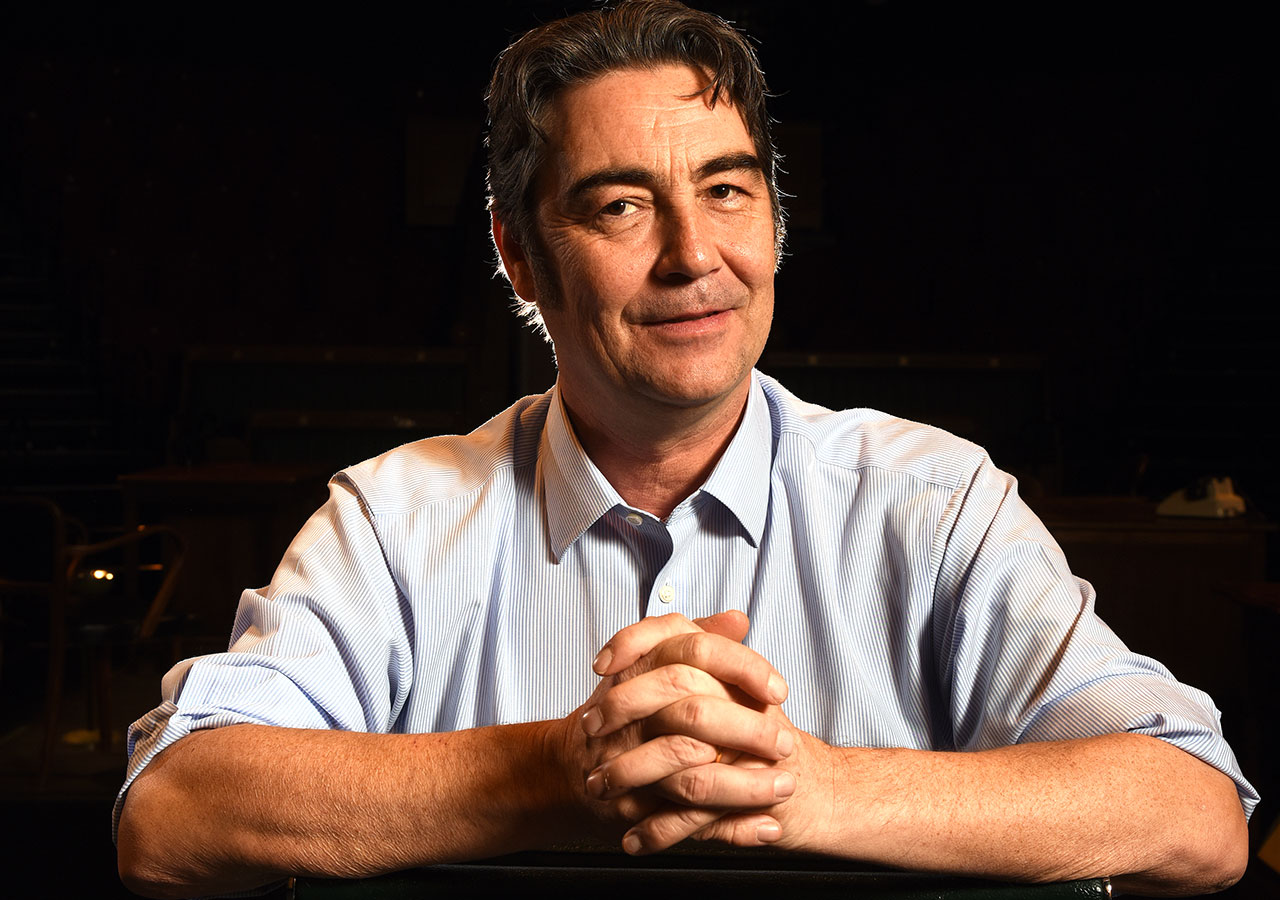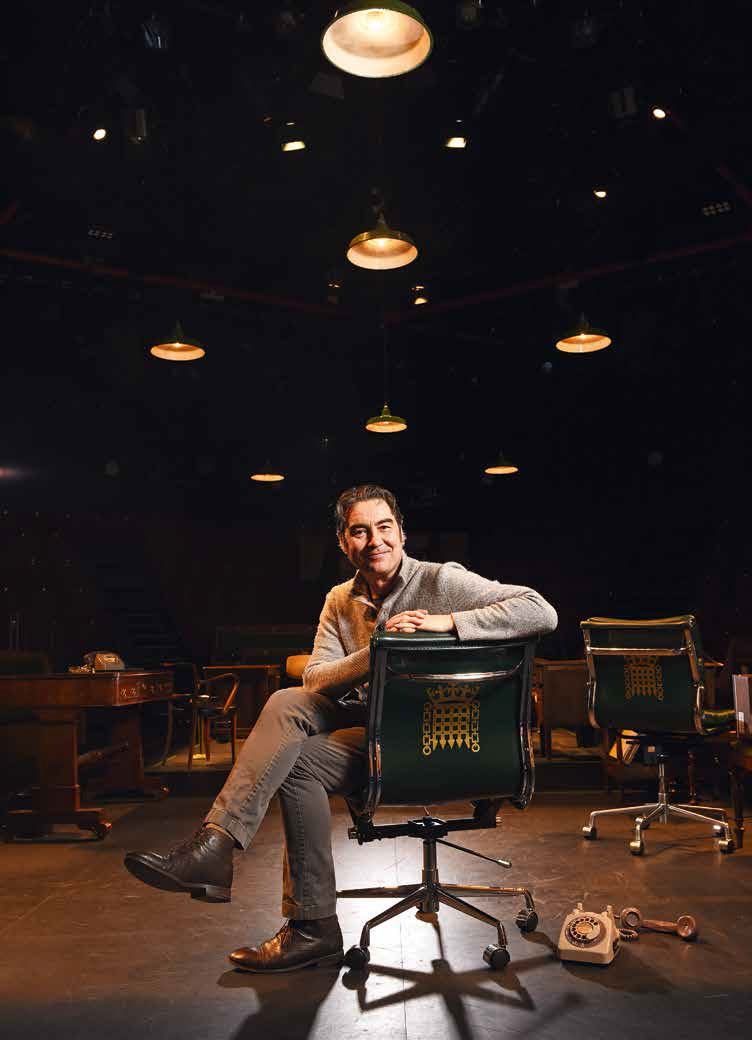'I was 8–1 to be the next Bond just before Daniel Craig got it': Nathaniel Parker on life, acting, and his big near-miss
Nathaniel Parker catches up with Jack Watkins about David Cameron's epic gaffe, and the time he nearly became James Bond.


Is Nathaniel Parker the best 007 we never had? He’s recently completed another of his ‘Young James Bond’ audiobook recordings, in which he proudly delivers the sanctified line: ‘My name is Bond, James Bond.’ Surely, with his darkly handsome looks and string of credits as a dashing, upper-middle-class spy or sleuth, he must have been a contender for the big-screen role at some point?
‘I did find out I was 8–1 to be the next Bond just before Daniel Craig got it,’ he laughs.
‘I thought perhaps if I went into the bookies and put £200 on, it would bring the price down and people would say: “Ooh, look, Nat Parker’s been made favourite”.’
Now in his fifties, he admits his chance is currently about 2,000–1, but although Mr Parker might be most widely famous as DI Tommy Lynley, 8th Earl of Asherton, in the BBC series The Inspector Lynley Mysteries, he’s also an accomplished stage actor.
His new play, James Graham’s political drama This House, was a sellout when it was first staged at the National Theatre in 2012 and Mr Parker points out that its new West End run couldn’t be more timely.
‘It’s said Shakespeare’s plays are still relevant today and so’s this,’ he says.
‘It harks back to the turbulent times all the main parties went through when Labour was in power between 1974 and 1979. There’s a line that goes “Three changes of leaders—has that ever happened before in one go?”
Exquisite houses, the beauty of Nature, and how to get the most from your life, straight to your inbox.
‘Recently, we’ve seen leadership contests or changes in at least six parties,’ he continues.
‘As well as making serious points, the elements of farce in the play are extraordinary. Labour lost 17 MPs through death over the period. There are meetings in cupboards and one in which, with terrific irony, the Ulster Unionists go down to the Gunpowder Plot cellars to sign a paper.’
Centring around the machinations of the Labour and Tory whips’ offices—the illustrious cast includes Phil Daniels, Kevin Doyle and Steffan Rhodri—Mr Parker plays ‘Jack’ Weatherill, the Conservative deputy chief whip who became famous as Speaker during the first televised broadcasts from the Commons.
I ask if, as the son of Sir Peter Parker, chairman of British Rail during the Callaghan and Thatcher administrations, he identifies with the era.
‘I did grow up with it, yes,’ he answers. ‘My father was very centre-left and once stood as a Labour candidate. I remember people such as Shirley Williams and Roy Jenkins coming to our home. And Jack Weatherill, who was a very upright guy, would have known my father, something which thrills me immensely.’
Despite his well-heeled public image, it’s clear Mr Parker shares his father’s centre-left sympathies and he reminisces about him fondly.
‘I’d get very cross and say “You have to stand up for your beliefs”, but he’d reply that the world revolves around compromise and he’s quite right.
‘He was always a compromiser. He had ASLEF, a Trotskyite rail drivers’ union, on one side to deal with and Mrs Thatcher on the other. He did seminal work in the creation of the Channel Tunnel, but she didn’t even invite him to the opening.
‘They were complete opposites. He was charming, whereas I never heard anyone call her charming and she certainly didn’t compromise.’

Mrs Thatcher has always divided opinion, but as a man who spoke out on behalf of Remain during the EU Referendum campaign, he agrees that her heir (David Cameron) has got off lightly.
‘For the sake of winning a few votes off UKIP, we’ve put our country on the market, are taking it out of Europe and will probably lose Scotland as well.
'What the hell did he think he was doing?’
Mr Parker is a man who engages full on with everything he does. His voice dries with emotion as he recalls meeting the women running an aid camp at the time of the Chad-Darfur humanitarian crisis, when he slept in a cell full of rats and was asked to give an account of the situation by the then Prime Minister, Gordon Brown. He is appalled by Britain’s laggardly approach to the current Syrian refugee crisis.
He’s probably too heart-on-sleeve to make a politician, but his passion is infectious. With an uproarious laugh that he must surely have deployed to thunderous effect in his Olivier-winning and Tony-nominated performance as Henry VIII in Wolf Hall/Bring Up The Bodies, he never takes himself too seriously and is great company. I’m treated to amusing impressions of Mr Brown, as well as Sir Terry Wogan, an imaginary barking dog loose on a film set and the similarly dark and stylish racehorse trainer Sir Henry Cecil.
As a Turf enthusiast, Mr Parker met the latter shortly before he died in 2013. ‘I was due to ride in a charity race at Newmarket and went to see Frankel [the unbeaten racehorse trained by Cecil] on the gallops,’ he says.
‘Henry invited me back for breakfast and when I mentioned I was converting a barn at home into stables, he said “My dear boy, have you got a horse? Do you want one?”
‘A few months later, this fantastic thoroughbred arrived. It had been Frankel’s lead horse on the gallops and had won £120,000 in prize money.’
Sadly, Sir Henry died a couple of months later and, shortly after, so did the horse, from a severe bout of colic, but Mr Parker, who likes a serious punt, remains closely involved in the sport and is a part-owner of the dual-purpose grey Tindaro, trained by Peter Webber.
He may never get to play Bond, but Mr Parker has just secured the rights to a thriller from the 1930s golden age of crime writing which he’s trying to make into a film.
It’s written by Nicholas Blake, the pseudonym used by Cecil Day Lewis for his mystery stories.
When he tells me the first line, it crackles with suspense and, already, I’m intrigued. He hopes to get it off the ground in 2017. Odds on, it will be a winner.
Interview by Jack Watkins
Country Life is unlike any other magazine: the only glossy weekly on the newsstand and the only magazine that has been guest-edited by His Majesty The King not once, but twice. It is a celebration of modern rural life and all its diverse joys and pleasures — that was first published in Queen Victoria's Diamond Jubilee year. Our eclectic mixture of witty and informative content — from the most up-to-date property news and commentary and a coveted glimpse inside some of the UK's best houses and gardens, to gardening, the arts and interior design, written by experts in their field — still cannot be found in print or online, anywhere else.
